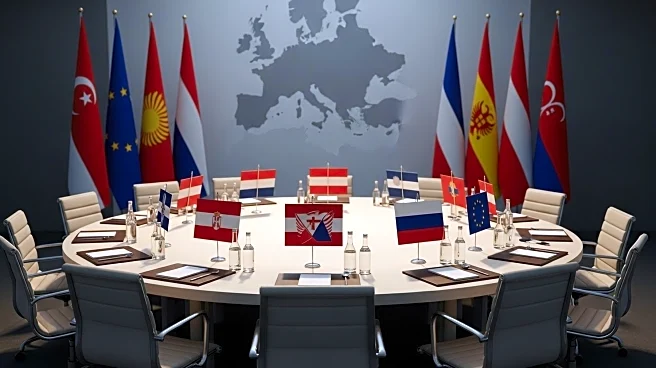What's Happening?
Leaders from the Western Balkan nations convened in Golem, Albania, to discuss strategies for accelerating their economic integration with the European Union. This meeting is part of the Brdo-Brijuni Process, a diplomatic initiative launched by Slovenia and Croatia in 2013 to support EU enlargement in the Western Balkans. The region includes Albania, Bosnia, Serbia, Montenegro, North Macedonia, and Kosovo, all of which are at varying stages of EU membership candidacy. The summit, led by Albanian President Bajram Begaj, Slovenian President Natasa Pirc Musar, and Croatian President Zoran Milanovic, aims to strengthen political dialogue and promote reconciliation in a region still affected by past conflicts. The EU's interest in expanding its membership has increased since the onset of the war in Ukraine, raising concerns about potential geopolitical spillover into the Balkans.
Why It's Important?
The integration of Western Balkan countries into the EU holds significant geopolitical and economic implications. For the EU, expanding its membership to include these nations could enhance regional stability and counter Russian influence, especially in light of the ongoing conflict in Ukraine. For the Western Balkans, EU membership promises economic growth, political stability, and improved governance. However, the path to membership is complex, with each country facing unique challenges. Montenegro and Albania are currently leading in the accession process, while others like Serbia and Bosnia face more hurdles. Successful integration could lead to increased foreign investment and development aid, benefiting the region's economies and societies.
What's Next?
The summit's hosts are expected to hold a news conference to outline the outcomes of the discussions. The Western Balkan countries will likely continue to work on meeting EU accession criteria, which include reforms in governance, rule of law, and economic policies. The EU may also increase its diplomatic and financial support to facilitate these reforms. Additionally, ongoing tensions, such as those between Serbia and Kosovo, will need to be addressed to ensure a smooth integration process. The geopolitical landscape, particularly the situation in Ukraine, will continue to influence the EU's enlargement strategy.










